

Project «Voices of Jewish settlements. Vitebsk region.»פיתוח קשרי התרבות בין העמים של ישראל ובלרוס
|
|---|
Website search |
|
MainNew publicationsContactsSite mapVitebsk regionMogilev regionMinsk regionArkady Shulman
|
Lea ApartsevaDAYS OF MY CHILDHOOD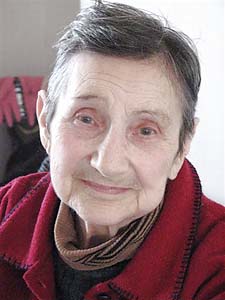 Lea Apartseva.
Lea Apartseva.
Liozno is a small town located between Vitebsk and Smolensk. Here stood a huge mansion which once belonged to Khlustin - he was a wealthy man and owned orchards, fields, valleys, forests and numerous villages. It was a picturesque and clean town surrounded by the River Moshna with lush green banks, covered with shrubs and willows. It was mostly populated by Jews. Liozno was an ancient town and the tombstones in the old cemetery could prove that – many of them were unattended, covered with moss, with unintelligible, half-erased inscriptions in Hebrew. We, children, could not make out what was written there (it was 1930). These stones, resembling old men, rooted themselves deep in the ground and kept the memories of long-gone generations. People lived here very poorly. Small plots of land were usually planted with berries and some people managed to plant several fruit trees, which was considered a luxury. However, not all people were lucky to own houses and land – many had to rent rooms, which frequently could be really tiny. A lot of Liozno residents were craftsmen; a few were involved in trade and owned small shops, which provided the town and neighboring settlements with necessary goods. 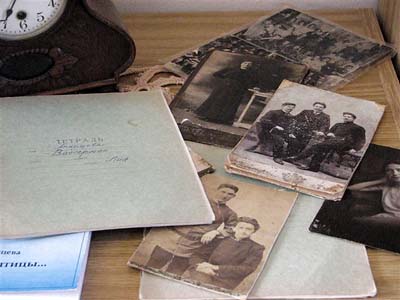 Photos from family album.
Photos from family album.
The town had its own trade fairs, which attracted people from the neighboring villages. It was a great opportunity to sell agricultural products and buy everything necessary: tools, clothing, shoes, salt, sugar, soap, grain, etc. A railroad and a railway station were built in Liozno in the second half of the 19th century. Several Russian families – the railway workers - settled down in Liozno. Jews could not be employed by the state at that time. Neither were they allowed to attend educational institutions. But Liozno was different – everyone studied here. Many children attended the Heders and some of them used self-education books. The town had its own amateur theatre. In 1747 Shneur-Zalman, the renowned founder of Lithuanian-Belarusian Hassidism, was born in Liozno. As soon as he turned 15, he moved to Vitebsk and then returned to Liozno in 1782. He was a man of enormous talent and charisma. He died on December 28th, 1812 in count Tolstoy’s cart when the Russian army was retreating to Kursk. He actively participated in the war against Napoleon. 140 years later, on July 7th, 1887, Mark Chagall was born in Vitebsk. He frequently came to Liozno to visit his numerous relatives. His uncle was a barber and owned a shop here. Those, who are familiar with Mark Chagall’s creative work, remember his picture depicting a two-storey house with a signboard at the entrance: “Barber Chagall”. I remember the stairs and the entrance – my mother took me there for a haircut when I was small. Neither we, nor any other Liozno residents were aware that the great Jewish artist had actually entered that building. After the revolution, when everyone was given a chance to study and work, young people headed for big cities to study. Liozno also had a new school with excellent teachers. The school’s principal, Kaplan, built new sports grounds, a boarding school for children who were not local and provided the students with breakfasts. 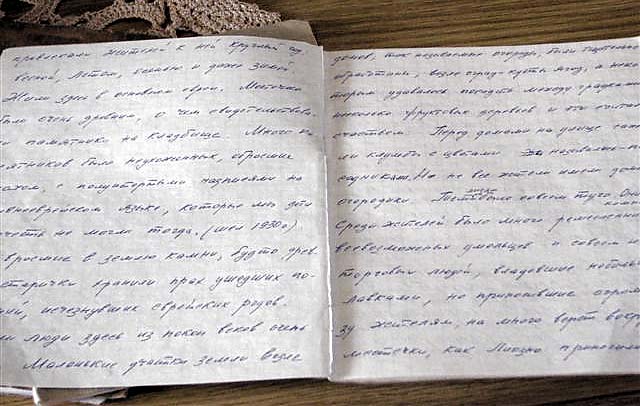 Lea Apartseva’s manuscript.
Lea Apartseva’s manuscript.
In 1930 our family had to leave Liozno. Unwillingly we said goodbye to our relatives: the Abarbanels, who had always supported us at difficult times, the Temkins, the Myshelovins and all the friends and neighbors: Amburg, Amusin, Bogorad, Borodulin, Braude, Brumin, Bylykin, Vilenkin, Glazov, Gratvovov, Ginzburg, Dozorets, Zamfort, Kah, Kagan, Kravchik, Lazarev, Levit, Mirmovich, Lev, Pevzner, Pertsov, Prosmushkin, Margolin, Romanov, Sorkin, Hanin, Hainson, Havkin, Cherniakov, Chernin, Shlosberg, Heifets, Shershever, Bdovin, Yahliel, Yahnin – all of them were shot in 1941. For certain I have forgotten some of the names (I was only nine at the time). All of them were shot in a deep ravine in a grove that had once belonged to Khlustin. In 1947 my mother came to Liozno to visit the burial place of those people. However, as she approached the ravine she dashed back in horror – it was filled with white human bones. They were scattered all around the ravine. Mother rushed to look for people. After walking many kilometers on foot she gathered ten Jews from Rudnia and Kolyshki. They made white bags, carefully put the bones into them and buried them in the same place. Then they said a prayer. They left the place in despair and sadness. Mother was sick after that trip for a long time. I managed to visit Liozno in 1963. I, together with my husband, my sister and her husband were driving along a deserted road near the railway station. The place was completely empty: no roads, no streets, no houses and no people. The former town square, where all the shops used to be located, was filled with the ruins of what had once been an Orthodox church. We drove on a little farther and saw two houses made of stone. One of them was built on the place where our house had stood. We recognized the place by a bridge and a poplar which grew in our yard. The tree stood there unharmed, as if waiting for us – it had witnessed all the horrors. The River Moshna was no longer there – we saw a small stream instead of it. Chagall’s house had also been replaced with a different building – a small shop. It was drizzling, so we entered the shop to hide from the rain. We approached the shop assistant: - Excuse me, - my sister said. – Do you happen to know if anyone from old residents still lives here? 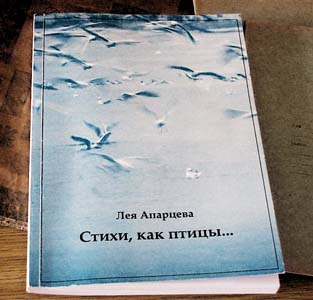 Lea Apartseva’s poem collection.
Lea Apartseva’s poem collection.
- No, no one is left. All the Jews were killed. Very few, who were lucky to evacuate, never came back here. We left the shop. Now the rain was pouring and it looked gloomy and dark. We got into the car and sat there silently for a while. - I cannot stand this any longer, - my sister’s husband said and drove off. While we were driving towards the old road to Smolensk I looked to the right. Instead of Khlustin’s orchard I saw deserted uncultivated land. I was grief-stricken all the way to Leningrad. The Jews have been killed, the river has dried out, and the nature has withered. I could even see the faces of the executed children, women, and old people. I remembered their gestures, the way they walked and it seemed they were stretching their arms towards me. It seemed to me I heard their voices: “Why? What for?” It seemed to me they were telling us: “Do not let it happen again! Be strong! Love and respect each other, you, all the people who have survived.” ***We live in Liozno. I have a brother and a sister. My brother is in the fourth grade and the sister is in the second. They are so happy! They can go to school! I wish I could go to school, too! But I am told: “You are still too small. Your time will come.” In the morning our granny makes sausage sandwiches – breakfast for my brother and sister. Mother buys this special delicious sausage for them. It smells so nice! When brother and sister leave, I stay with my granny. These days I do not venture outside so often – it is getting cold and my cheeks and fingers freeze very quickly. The garden and the orchard are snowbound. The apple trees look so lonely in the frost! I shout to them: “Hello, apple trees! Don’t freeze! Wait for the spring!” And then I go back because I cannot reach them – the snow is too deep. But now I believe they actually feel better after my encouragement. Everyone feels better when they are talked to. Then my sister comes back from school. She’s got big grey eyes and short blond hair. Her name is Dora. She is a good student, actually considered to be the best at school! Then my brother arrives a little later. He is truly handsome and tall. He is also a good student and loves nature. He has hedgehogs, rabbits and birds, who I like as well. My brother’s name is Ziama. 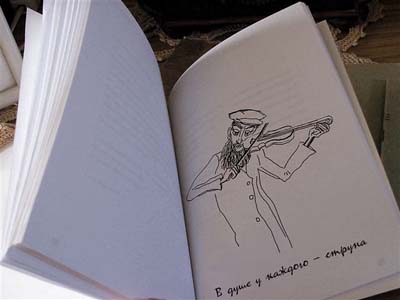 Lea Apartseva’s poem collection.
Lea Apartseva’s poem collection.
Ziama also has a violin, which is kept in a nice-looking case. M y brother and sister eat their lunch and discuss something. Later their school friends arrive – everyone laughs, jokes and play bingo. I would love to hear their stories and play with them but I am shown the door and made to stay in the bedroom. This is unfair! I want to grow up and become a schoolgirl just like them. But the time crawls and I do not grow for some reason. I take a book from the bookshelf and look at pictures. I remember one of the books is really scary. It is a book by Gogol and it has pictures of devils. I take it out and open the scary page. It is so frightening that I close it immediately and put it back on the shelf. The devils have gone. My favorite book is Krylov’s fables because it contains so many fascinating pictures. In comes my sister and takes the book away from me. - You might tear the book, - she says. – You know this book is very expensive. Moreover, you will not understand anything here. So I go to the kitchen where my granny is. She is the best person to be with! She is so kind and, in addition, she knows lots of interesting fairy tales… Then spring comes. It feels great to run and step into the puddles. I can feel the smell of the ground, which is waking up after the winter. What extraordinary smell! It will not be there in a few days because the sun will dry it out. I see my brother coming out of the gate with a glass jar in his hands. 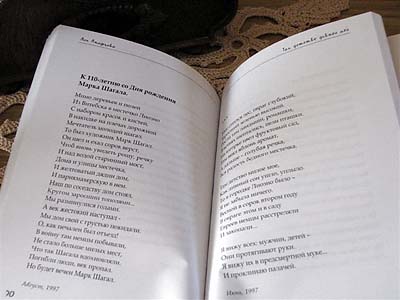 Lea Apartseva’s poem collection.
Lea Apartseva’s poem collection.
- Where are you going? – I shout to him. - To get birch sap in the forest – he replies. - I am going with you! - No, you can’t! It’s too far. You are too small. You will get tired. But I follow him anyway. - You shouldn’t follow adults, you are just a baby. Don’t get upset, please. I promise to bring you a lot of birch sap! Then he waves at me. I fell sad that I am left alone. My feet get wet. I feel cold. - You’ve soaked to the skin! – granny exclaims. Come on, let’s go home or you will get a cold. She takes me by the hand and drags me in. The house is warm, light and sunny. It smells of fresh bread because grandmother has just baked some. - Granny, can I get the crust? – I ask. - No, first of all you should wash your feet! She brings me a basin and I put my feet into the warm caressing water. My whole body gets warm and now I am unwilling to take my feet out. - Ok, wipe your feet dry and then you can get the bread. She brings a mug of milk and a big piece of bread crust. Life is wonderful! My brother and sister come back home and bring the smell of the forest, the sun, the spring and happiness. Scarlet fever.My brother and I have scarlet fever. Mother decided we would stay at home and not go to hospital. Mother sent the sister to granny’s cousins, the Abarbanel sisters, so that she would not contract it from us. No one visited Dora there but she felt just fine. Brother and I have a lot of fun despite the disease. Ziama narrated me fairy tales and I told him everything I had heard from our granny. Then, as we got better, we pretended to be travelling. The chairs were turned into ships and we sailed to discover new unknown lands and countries. Sometimes we had shipwrecks when the chairs fell. Mother was dissatisfied but never shouted at us. She brought us fruit and chocolate because she said it would make us recover faster. My brother was five years older than me, very tender and kind. We had so much fun back then. Never again did we have such long and exciting communication! He had his own friends and his own life, inaccessible for me. When we grew up he got married and we met very rarely. I was always worried about him and called him almost every day from a telephone box. As soon as we got a phone at home, I called him every evening to see how he was doing. But his wife usually said: “He is sleeping” or “He has gone shopping” and so on. I still cannot figure out why she did that. He would only call us on holidays and send the best postcards. But that happened later. Meanwhile, about eight months after our recovery, my sister was down with scarlet fever. So I was sent away this time to our other relatives – the Myshelovins. Melancholy.The Myshelovins lived very far from our street – in Vokzalnaya Street. They turned out to be middle-aged people (both their children had gone to study in Moscow), they looked old and lonely. Maybe they were not that old but in comparison with my mom, who was beautiful, they looked withered. I do not remember their names. The lady was tall and slim, she had a kind but sad face. I thought: she must miss her sons. Her husband was tall and broad-shouldered, and also very good-natured. - Now you will sleep here, on this bed. Make yourself at home and don’t be shy, - he said gently. Mother said before leaving: 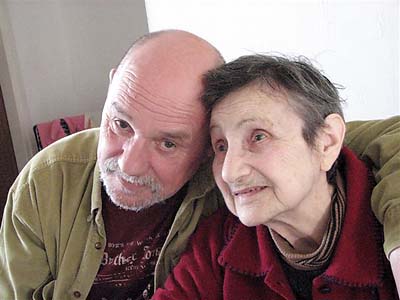
- You will stay here for three months until Dora recovers completely. No one will come to visit you, we cannot! Do you understand? - What about Ziama? – I asked. - He is staying with the Temkins. Be a nice girl and study well. I was already a school student at that time. Now I had to take a different road to school. The time at school was the same but when I came back to the Myshelovkins, everything felt wrong. I remembered my granny, her caressing hands and the smile. Everything around looked wrong, even the food did not seem to be as tasty. The table, the lamp above my head and even the air – everything appeared sad and boring. My eyes must have expressed my feelings and the man said to me: “You will feel better after lunch.” I thanked them and said everything was delicious – I did not want to offend these nice people. I lied for the first time in my life. - So, what about now? Are you feeling better? Everyone feels better after they eat, - the man said and smiled. However the melancholy crawled up to me again like a snake and squeezed my throat. I do not remember how long I stayed with these nice and kind people. I did my homework after lunch and then went to school in the morning. It seemed like eternity. I knew nothing about my home. I even lost hope I would ever come back. I was sure I was going to stay there forever because everyone had forgotten about me. Melancholy followed me everywhere – outside, at home, at school… But one day my mom’s friend Zlata came and said: - Your relatives are sending you their love. They are doing fine. It made me feel so amazing. She added: - Soon you will return home, as soon as Dora’s skin stops peeling. Back then I realized that melancholy is a serious disease, perhaps more serious than scarlet fever and Zlata’s words were like medicine that cured me. … How fast I ran home! Someone strong seemed to be pushing me from behind. I ran along the streets and all the streets seemed to recognize me and ask: “Where have you been for so long?” I pushed the front door as hard as I could. “I am home! I am home! It’s happiness!” I was ecstatic inside, but I did not utter these words aloud. I was too shy to express the emotions I was filled with. I was still the youngest in the family. But my granny understood everything. She always understood everything, my granny… |
|||
|
|
Jewish settlements in Vitebsk regionVitebsk • Albrehtovo • Babinovichi • Baran • Bayevo • Begoml • Beshenkovichi • Bocheikovo • Bogushevsk • Borkovichi • Braslav • Bychiha • Chashniki • Disna • Dobromysli • Dokshitsy • Druya • Dubrovno • Glubokoye • Gorodok • Kamen • Kohanovo • Kolyshki • Kopys • Krasnopolie • Kublichi • Lepel • Liady • Liozno • Lukoml • Luzhki • Lyntupy • Miory • Obol • Oboltsy • Orsha • Osintorf • Ostrovno • Parafianovo • Plissa • Polotsk • Prozorki • Senno • Sharkovshina • Shumilino • Sirotino • Slaveni• Smolyany • Surazh • Tolochin • Ulla • Verhnedvinsk • Vidzy • Volyntsy • Yanovichi • Yezerishe • Zhary • Ziabki • |
Main |
New publications |
Contacts |
Site map |
Vitebsk region |
Mogilev region |
Minsk region |